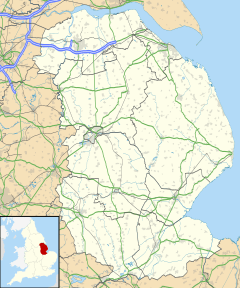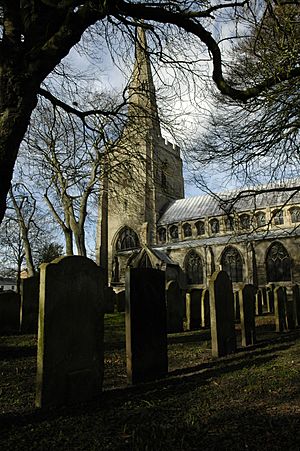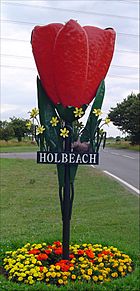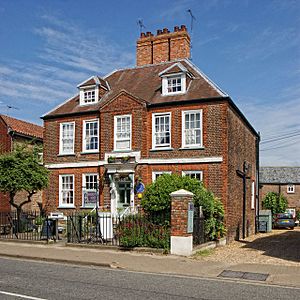Holbeach facts for kids
Quick facts for kids Holbeach |
|
|---|---|
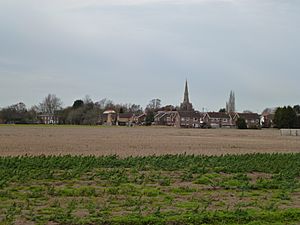 Skyline of Holbeach |
|
| Population | 11,186 (2021) |
| OS grid reference | TF358248 |
| • London | 85 mi (137 km) S |
| Civil parish |
|
| District | |
| Shire county | |
| Region | |
| Country | England |
| Sovereign state | United Kingdom |
| Post town | SPALDING |
| Postcode district | PE12 |
| Dialling code | 01406 |
| Police | Lincolnshire |
| Fire | Lincolnshire |
| Ambulance | East Midlands |
| EU Parliament | East Midlands |
| UK Parliament |
|
Holbeach is a busy market town and civil parish in the South Holland District of Lincolnshire, England. The town is located about 8 miles (13 km) from Spalding. It's also 17 miles (27 km) from Boston and 20 miles (32 km) from King's Lynn. Holbeach sits at the meeting point of the A151 and A17 roads.
The Prime Meridian, an imaginary line that divides the Earth into eastern and western hemispheres, runs through the west side of Holbeach. You can find a special millstone at Wignals Gate that marks its path.
Contents
History of Holbeach
Ancient Times and Early Settlements
People have found Roman and Romano-British pottery in and around Holbeach. This shows that people lived here a very long time ago.
Market Town Beginnings
Holbeach became a market town in 1252. This happened when Thomas de Moulton, a local important person, was given a special permission called a market charter. This allowed the town to hold regular markets, which helped it grow.
All Saints' Church and Hospital
The beautiful All Saints' Church was built in the 1300s. Its porch, added around 1700, might even include parts of de Moulton's old castle. A hospital linked to the church was started in 1351 by Sir John of Kirton. It was meant to help a warden and fifteen poor people.
Reclaiming Land from the Sea
For a long time, the sea was very close to Holbeach, only about 2 miles (3.2 km) away. There were big floods in the 1200s and 1500s. To stop the floods and create more land, people started huge projects to drain the land.
These projects moved the coastline of the Wash about 9 miles (14 km) away. This left Holbeach surrounded by over 23,000 acres (93 km2) of new, very rich reclaimed farm land. Over many years, more and more land was added to Holbeach parish through these efforts. By 1840, a total of 12,390 acres (50.1 km2) had been added.
Culture and Transport
In 1829, a theatre was built in Holbeach. It was known as the 'Public Rooms'. The town also got a railway station in 1862, connecting it to other places. However, the railway line closed to passengers in 1959 and completely in 1965.
The 1800s also saw new churches built, including a Wesleyan chapel in 1808 and a Baptist chapel in 1845. During World War II, special defenses called pillboxes were built near Holbeach to protect the area.
Geography of Holbeach
The name "Holbeach" refers to both the town and its larger civil parish. This parish is one of the biggest in England. It stretches from Cambridgeshire all the way to the Wash, covering about 16 miles (26 km) from north to south and 4 miles (6.4 km) from east to west.
The total population of the parish is nearly 24,000 people. About 10,000 of them live in Holbeach town itself. The town has the most people and services compared to the smaller villages around it that share the "Holbeach" name.
Villages Sharing the Name
You'll find the name Holbeach in several nearby villages in the Lincolnshire Fens. These include Holbeach Bank, Holbeach Clough, Holbeach Drove, Holbeach Fen, Holbeach Hurn, Holbeach St Johns, Holbeach St Marks and Holbeach St Matthew. It's common in this area for several close villages to share a main name.
Water Management
The South Holland Internal Drainage Board is now in charge of managing the water and drainage around Holbeach. This group helps keep the land from flooding.
Economy
Holbeach's economy is mostly based on processing food and growing bulbs. The biggest supplier of tulip and daffodil bulbs in the United Kingdom is located north of the town. Flour is still milled at Barrington Mill.
Community Life
Holbeach has several local public houses, which are traditional English pubs. These include The Red Lion, The Horse & Groom, the Mansion House, and the Crown Hotel.
The Royal Air Force (RAF) has a bombing range called RAF Holbeach nearby. It's located on salt marshland along the coast, about 11 miles (18 km) north-west of the town center.
Education
Holbeach has two primary schools: Holbeach Primary School and William Stukeley Church of England Primary School.
The local secondary school on Park Road is now called the University Academy Holbeach. It used to be known as the George Farmer Technology & Language College.
Holbeach is also home to a campus of the University of Lincoln. This campus, called the National Centre for Food Manufacturing, focuses on food manufacturing technology. It was redeveloped in 2004.
Media
Local news and TV shows for Holbeach come from BBC Yorkshire and Lincolnshire and ITV Yorkshire. You can also get TV signals from other transmitters like Waltham and Sandy Heath.
For radio, Holbeach is covered by BBC Radio Cambridgeshire and BBC Radio Lincolnshire. Other stations like Greatest Hits Radio Lincolnshire and Hits Radio Lincolnshire also broadcast here. Local newspapers include Spalding Today and Spalding Voice.
Sport
Holbeach United Football Club
The local football club is Holbeach United, which started in 1929. The team plays in the United Counties League. They are known as the "Tigers." This nickname comes from the 'Fen Tigers', who were local people in the 1700s. They fought against the draining of the Fens, which changed their way of life.
Speedway Racing
In the past, speedway racing took place near Holbeach at Bell End in Whaplode St Catherine. These races happened shortly after World War II but stopped in 1948.
Notable People from Holbeach
Many interesting people have connections to Holbeach:
- Norman Angell (1872–1967) was born here. He won the Nobel Peace Prize in 1933 for his work promoting peace.
- Boz Burrell (1946–2006) was a bass guitarist for famous bands like King Crimson and Bad Company.
- Geoff Capes (born 1949) is a former shotputter and was once named the World's Strongest Man.
- Susanna Centlivre (c. 1667–1723) was a very successful female playwright and actress in the 1700s.
- William Stukeley (1687–1765) was an antiquarian (someone who studies old things). He was a pioneer in studying famous ancient sites like Stonehenge and Avebury.
Freedom of the Parish
The "Freedom of the Parish" is a special honor given to people or military groups.
Individuals
- Terrence Neville "Terry" Harrington: Received this honor on August 13, 2015.
See also
 In Spanish: Holbeach para niños
In Spanish: Holbeach para niños
 | William M. Jackson |
 | Juan E. Gilbert |
 | Neil deGrasse Tyson |


